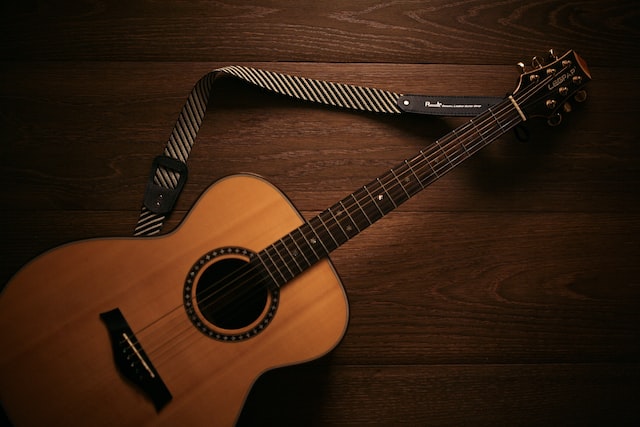BecomeSingers is reader-supported. When you buy through links on our site, we may earn an affiliate commission. Learn More
It takes patience, commitment, and a lot of practice to become a great guitarist. If you’re just starting out with your guitar lessons or picking up the instrument again after a long break, it can be overwhelming and challenging to take the right approach to get better and improve your guitar playing skills. However, we’ll provide you with a detailed guide, including the best tips and strategies that will help turn this journey into a rewarding and enjoyable experience, as it should be.

In this article, we’ll show you the most effective techniques and tricks to help you become a better guitarist, as well as the most common mistakes you need to avoid if you don’t want to experience slow progress and frustration on your learning journey. So keep reading if you want to discover the secret to honing your skills and becoming a skilled musician.
Table of Contents
How Do You Get Better at Guitar?
The secret to improving as a guitarist is consistent practice. Create and conform to a consistent practice routine. Focus on learning the basics and understanding music theory so you can build a solid skill set. Additionally, seeking guidance from a guitar teacher and other musicians can be incredibly helpful.
How often have you seen a friend or a family member start taking lessons, be incredibly enthusiastic about it for the first few months, and then completely lose interest? This happens because most people have unrealistic expectations and underestimate the amount of time and effort they have to put in to see even the tiniest bit of progress in their guitar learning journey.
The answer to “how do you get better at guitar” is pretty straightforward. Learn about music theory, experiment with different styles, and practice regularly. Unless you’re a music prodigy, you won’t see results in a couple of days, even weeks. It will take months of hard work and practice to be able to see any improvement in your skills. You need to build your muscle memory, learn your chords, and devote as much time as you can learning to play by ear, as that is a key component to developing not only as a guitarist but as a musician overall.
Tips to Become a Better Guitarist

There’s always room to improve your guitar skills, regardless of how experienced you are as a musician. Let’s look at some essential tips and tricks to help you grow into the musician you’ve always wanted to be.
1. Start With The Basics
Before you can tackle more advanced techniques, it’s important to master the basics of guitar playing. This includes things like how to hold a pick, tune a guitar, proper posture and hand positioning, chords, strumming patterns, and different techniques such as fingerpicking and alternate picking. Start by learning the basic guitar chords and then move on to more advanced chords. Once you have mastered those chords, start practicing basic strumming patterns. By starting with the basics and working your way up to more complex techniques while keeping track of your progress, you can build a strong foundation for your guitar playing.
2. Learn To Read Music
Having the ability to read sheet music will significantly expand your musical horizons as a guitarist. It will allow you to play a wider range of songs and styles, and help you develop a better understanding of music theory, including key signatures, time signatures, and chords. It has been proven to improve your memory and multi-tasking skills. And finally, it allows you to read, write and compose your own music, which is one of the biggest advantages of learning to read sheet music.
There’s no denying that it’s challenging at first, so start with the basic guitar notation and work your way up to more advanced sheet music.
3. Experiment With Different Genres
Experimenting with different genres of music can help you become a more versatile musician. Try expanding your horizons and playing songs from different genres, such as rock, blues, country, and classical, instead of just sticking to just one genre and staying in your comfort zone. The more music genres you listen to and play, the more you’ll learn about various playing techniques, chord progressions, melodies, and rhythms.
Not only will this help you develop a deeper understanding of the guitar and how to express yourself through it, but it will also open opportunities and doors for you by making it easier and more accessible to collaborate with other musicians who play different genres of music, resulting in more job opportunities if you do this for a living.
4. Learn To Play With a Metronome
A metronome is a device that produces an audible beat at a consistent tempo and can be adjusted to match the desired tempo of the piece being played. It can be a valuable tool for guitar players as it helps with timing, rhythm, and accuracy while playing. By practicing with a metronome, you’ll be able to master playing at a slower tempo until you feel comfortable enough to increase the speed and reach the song’s original BPM (beats per minute.)
5. Try Different Guitar Techniques and Styles
There are many different guitar techniques and styles to explore. Try out new and different techniques like fingerpicking, legato, bending, tapping, picking, and many more. It’s also crucial to learn about alternate tunings, string skipping, using a capo, palm muting, barring, slaps and pops, and more. Each technique has its own distinctive sound and can be used to create different musical effects. So, it’s imperative to learn as much as you possibly can if you want to increase your knowledge and creativity.
6. Work On Your Finger Strength and Dexterity
Playing the guitar requires a certain level of finger strength and dexterity. Try performing exercises like finger curls, finger stretches, and hand grips to build up your finger strength. Playing simple scales and arpeggios and working up to more difficult ones as your fingers get stronger is another excellent way to hone your skills. Experimenting with different genres and techniques can also help you develop stronger fingers, as each technique requires your fingers to stretch and move differently. Just be patient and consistent, and you’ll feel your fingers getting stronger in no time.
7. Learn How To Improvise
The ability to improvise is crucial for any performing musician. It allows you to play freely, try out new musical ideas, compose your own solos and melodies, and express yourself musically.
Since improvising is the ability to play any song you want without the need to read sheet music or tabs, it is essential that you learn to play by ear. Start with basic music theory, including scales, chords, and chord progressions, as they are the building blocks of improvisation. Practice scales and modes and experiment with different techniques, such as pentatonic scales, arpeggios, and chord tones.
Playing with other musicians is also a fantastic way to develop your improvisational skills, as it will force you to adapt to their sounds and styles instantly.
8. Practice Regularly
Consistency is key when it comes to improving your guitar skills. Set a regular practice schedule and stick to it. Even just 30 minutes of practice each day can yield significant results. One of the best ways to ensure practicing regularly is by setting a specific time every day. This could be early in the morning or late at night. The important thing is that you stick to your schedule and not give up or get discouraged if progress seems slow at first.
9. Seek Guidance From a Guitar Teacher or Mentor
Seeking guidance from a guitar teacher or mentor can be incredibly helpful. A guitar teacher can provide valuable feedback and advice that will help you grow as a musician. They can help you set goals and track your progress, keeping you inspired and focused. They can also help you identify areas that need improvement and show you how to address them, allowing you to progress more rapidly than if you were to learn on your own. Additionally, you can seek online guitar lessons that can provide you with a more structured practice routine, letting you learn at your own pace, at your own time, and give you access to a wide selection of classes that focus on different techniques and exercises.
Things to Avoid When Trying to Get Better At Guitar
It’s pretty common for everyone, not just musicians, to fall into bad habits while trying to learn a new skill. This is usually brought on by a lack of patience, education, proper techniques, and being overwhelmed with the amount of new information coming at you at once. However, it’s always possible to break free of those habits and make the progress you want.

Let’s check out the most important issues to avoid when trying to improve your guitar skills:
1. Not Setting a Consistent Practice Schedule
One of the most typical mistakes that guitarists make is failing to set up a regular practice routine for themselves. Without one, it’s easy to become discouraged and lose motivation. To avoid this, schedule a specific period of time each day to practice, and make sure you stick to it. Even dedicating as little as 30 minutes a day to practicing your guitar can play a major role in keeping you interested.
2. Focusing Too Much On Perfectionism
Another common mistake is getting bogged down by perfectionism. While it’s essential to constantly push yourself and strive for improvement, it’s also important not to get discouraged by minor setbacks or areas that need work. Remember that becoming a great guitarist is a lifelong process, and it may take years of practice and dedication to reach a high skill level.
3. Not Challenging Yourself
Another common mistake is not challenging yourself and staying within your comfort zone. To improve your skills, you must push yourself beyond what you already know and experiment with new techniques, songs, and music genres. You will only grow as a guitarist if you’re willing to explore and try new things.
4. Not Taking Breaks And Paying Attention To Your Physical Well-Being
Another important aspect of practice is not to overdo it. Taking breaks is critical to prevent burnout and pain that, if ignored, could eventually lead to injury. Make time to relax and tune in to what your body and mind need. You are not obligated to practice every day if your fingers are sore or swollen from playing or if the repetitive hand and arm movements are putting a lot of strain on your body. When you feel better, which should be in a few days, you can resume practicing.
5. Not Recording Your Practice Sessions
Recording your practice sessions can be a valuable tool for tracking your progress and pinpointing areas that need improvement. Listening to your recordings and comparing them to your performances can help you evaluate your progress.

Additionally, you may not be aware of bad habits or technical problems while playing, but recording yourself can help you find them.
6. Not Listening To Other Guitarists
By listening to other guitarists, you can gain new perspectives and inspiration for your own music and pick up new techniques, chord progressions, and songwriting ideas. Also, studying different guitarists’ styles and playing techniques can give you a deeper understanding of the instrument and how to express yourself through it. However, it’s crucial to create your unique style and not blindly copy other artists.
7. Not Setting Specific Goals
The best way to keep yourself motivated and focused while practicing guitar is to set specific goals. Without them, it’s easy to lose sight of what you’re working towards and become discouraged. Set clear, measurable, and achievable goals for yourself and track your progress.
You could, for instance, divide learning to play a particular song into smaller objectives like mastering the chords, strumming pattern, and fingerpicking pattern. Or focus on the areas you need help with. For example, if you’re struggling with a particular technique, you can set a goal to work on it for a certain amount of time each day and keep practicing until you perfect it.
8. Not Being Patient
It takes time and persistence to develop as a guitarist. Even if you don’t see results right away, it’s important to keep a positive attitude and not give up. Keep in mind that developing into a great guitarist takes time and effort. Just be patient and stay relentless.
9. Not Having Fun
Playing guitar should be an enjoyable, relaxing activity that lets you express yourself musically. So remember why you started playing guitar in the first place and try to find ways to make it fun. If you’re not enjoying yourself and beginning to feel like playing is an obligation, it’s easy to lose your motivation and call it quits. So don’t stress yourself too much over the obstacles you’ll face while learning, and just enjoy yourself.
Check our article on Best Free Guitar VST by James Mann
FAQs
Is it hard to get good at guitar?
Is it painful to learn guitar?
How long does it normally take to get good at guitar?
Conclusion
Becoming a great guitarist takes time, dedication, and consistent practice. By starting with the basics, practicing regularly, and seeking guidance, you can build a strong foundation for your guitar playing. You can broaden your musical horizons by experimenting with various genres, practicing improvisation, and taking inspiration from other guitarists and musicians. Focusing on your physical well-being, setting clear goals, and enjoying yourself while playing is also important. Be patient with yourself, and keep in mind that mastering the guitar is a lifelong process. Don’t let failures or errors get you down; instead, use them as learning opportunities and keep moving forward. Last but not least, it’s crucial to have a positive mindset and to enjoy the journey of becoming a better musician.





